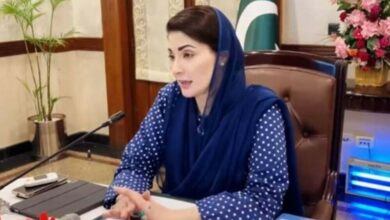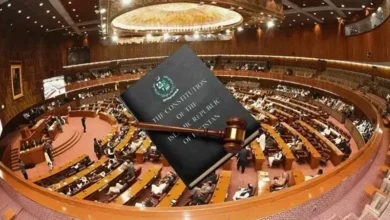India’s northeastern state of Assam goes to polls starting Saturday. For more than four decades, issues of immigration and citizenship have gripped the polity of the ethnically-diverse state bordering Muslim-majority Bangladesh.
But those core issues are missing from the election campaign this year, replaced by a two-pronged approach taken by Prime Minister Narendra Modi’s Bharatiya Janata Party (BJP): promises of development, employment and welfare schemes, and simultaneously creating fears of Muslim migrants taking over the state.
Prominent Assamese intellectual Hiren Gohain said he believes the BJP, which is fighting to hold on to Assam in this election, was uncertain about its hold over the masses in 2016 and therefore had chosen to stress the Assamese identity in that election.
“This time, there is a stress on the Hindu identity,” Gohain told Al Jazeera.
In other words, BJP’s Hindu supremacist politics, which thrive on hate campaigns against Muslims, seem to have overtaken ethnic Assamese nationalism, prevalent for decades in Assam.
NRC, CAA missing from the discourse
This is the first election in Assam since a controversial National Register of Citizens (NRC) – a citizenship verification process that attracted international criticism – was published in 2019.
The NRC initially was an exercise exclusive to Assam, where a push against any undocumented migrants, irrespective of religion, has been on for decades. A final list, published in August 2019, excluded nearly 1.9 million residents, a large number of them Muslims, who constitute more than one-third of the state’s population.
Those excluded in the NRC were asked to prove their citizenship in quasi-legal tribunals or risk being declared foreigners and stripped of their rights, including the right to vote.
The publication of the NRC in Assam was closely followed by the passage of the Citizenship Amendment Act (CAA), which paved the way for Hindu, Christian and other minorities from India’s Muslim-majority neighbouring countries to get Indian citizenship.
In Assam, the CAA effectively allowed migrant Hindus excluded by the NRC to receive Indian citizenship. The controversial law triggered large-scale protests in Assam while the fate of the Muslims excluded in the NRC remained unclear.
Hate campaign
In 2016, the right-wing BJP came to power in Assam, asserting the Assamese identity and assuring people it would “weed out illegal foreigners”.
Leading the right-wing party’s campaign in the state this year is 52-year-old Himanta Biswa Sarma, a politician who spent decades with the opposition Congress party, projecting himself as a secular leader, before jumping ship to join the BJP in 2015.
Sarma’s political rhetoric, now tailored to fit the BJP’s anti-Muslim image, has largely centred around one rival: Muslim politician Badruddin Ajmal, chief of the All India United Democratic Front (AIUDF) and member of India’s Parliament.
For the past several months, Ajmal, 71, has been the focus of Sarma’s taunts and snide remarks.
In February, Sarma declared Ajmal an “enemy of Assam” who represented “the most dangerous phase of Assam’s politics”. Other BJP leaders campaigning in the state have called Ajmal and his party “communal” and “anti-Hindu”.
Dressed in loosely fitted kurta-pajama (traditional Indian clothing), a skull cap and sporting a full beard, Ajmal fits the stereotype of a “maulana” (an Islamic scholar). He is also the state president of Jamiat Ulema-e-Hind (a council of Muslim theologians).
Dubbed a “perfume baron” because of the multinational family business he controls, Ajmal launched his AIUDF party in 2005 and enjoys immense support among Bengali-origin Muslim voters, concentrated mostly in lower parts of Assam.
This year, the AIUDF is fighting the election in alliance with the Congress party, possibly posing a serious challenge to the incumbent BJP, which has resorted to invoking fear of “more illegal migration from Bangladesh” to counter.
“They want to polarise the votes by making a villain out of Badruddin. This is their old tactic,” Ajmal told Al Jazeera over the phone, claiming that the BJP “wants to scare the 65 percent by showing the 35 percent (an estimate of state’s Muslim population) as a threat”.
“They want to turn this country into a Hindu nation, to turn a secular country into a Hindu majoritarian country, but that will never happen.”
Sanjib Baruah, professor of political studies at Bard College, New York, said the “majoritarian political climate” created by the BJP makes Ajmal “an easy target”.
“As he himself puts it, his attire, skull cap [and] beard make it possible to sell the fear of Ajmal as a representative or an advocate of migrant Muslims even though that’s not what he or the alliance stand for,” he told Al Jazeera.
The alliance has also meant the BJP will train its guns on Congress too.
In January, Sarma said “90 percent of legislators in Congress were descendants of Bangladeshi migrants”, forcing the centrist party to demand proof of their allegations from the BJP. Last month, Sarma remarked that Congress “can win 100 seats in Bangladesh”.
In response, Bhupesh Baghel, chief minister of Chhattisgarh state and Congress observer for Assam polls, said the BJP’s “hate [politics] will not survive and those spreading hate will be defeated”.
“BJP works on the same theory as the British Raj, to divide and rule. But this hate poison is not going to survive for long,” Baghel told Al Jazeera.
his campaign speeches, Modi’s closest aide and federal Home Minister Amit Shah also stressed that the Ajmal-Congress alliance was a “threat to state security and culture”.
“Each vote that Ajmal gets will fill Assam with infiltrators,” Shah said on March 14. He had earlier called Bangladeshi migrants “termites”, evoking a sharp response from Dhaka.
In the BJP’s campaign speeches and media statements, there are frequent references to “lungi” (a traditional garment worn around the waist) and “topi” (skull cap) – traits associated with Bengali-origin Muslims, also one of the poorest communities in Assam.
This week, the BJP’s election manifesto assured a delimitation exercise “to protect the political rights of the people of Assam” if it retains power.
Delimitation, in Assam’s context, would mean redrawing boundaries of the state assembly’s constituencies to represent changes in population.
The BJP’s promise has further sparked fears that the party seeks to limit the influence of migrant-origin voters and ensure that the “khilonjias” (Indigenous) rule the state.










